Rotary shifts, like the 4-on 4-off schedule, guarantee full work coverage — but here’s the tradeoff.
The complexities of shift planning — like ensuring accurate pay and handling time off — can intimidate even the boldest managers.
Luckily, you can organize alternating shifts painlessly with the right tools and know-how.
Let’s see how the 4-on-4-off shift pattern fits the bill so you can successfully set it up in your company.

What is the 4-on 4-off schedule?
The 4-on 4-off shift is a rotational schedule where employees work 4 consecutive days or nights, followed by 4 days off. Having 2 separate teams swap shifts ensures round-the-clock presence while preventing burnout.
Here’s a basic example of how the full 8-day cycle works.
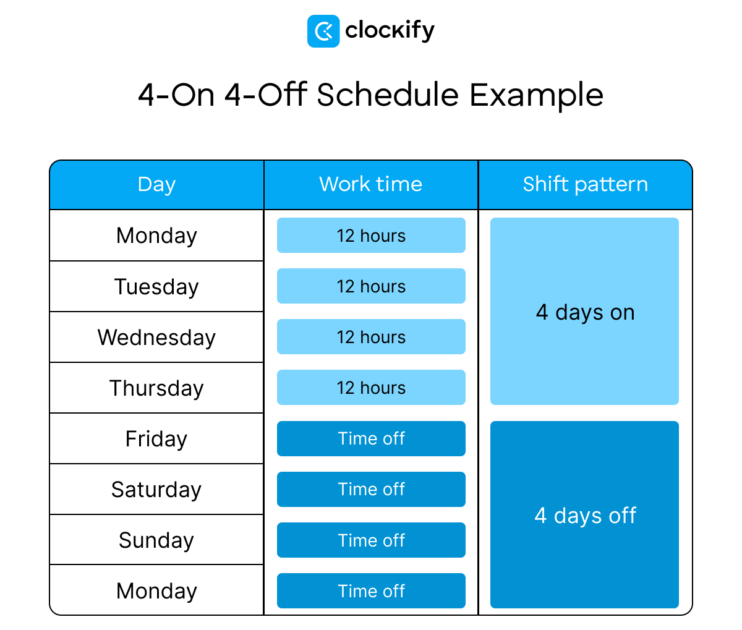
Under this work schedule, rest days don’t always fall on weekends. In fact, employees have to work 52 (out of 104) weekend days in a year.
Legally speaking, a 4-shift schedule is considered a compressed workweek, meaning workers put in longer hours over fewer days to meet the weekly 40-hour mark.
However, daily work hours can vary across companies and industries. To illustrate, a common firefighter schedule involves 4 12-hour shifts in a row, followed by 4 rest days. That’s a weekly total of 48 hours (or 8 hours of overtime).
Federal law mandates overtime pay for any time worked beyond 40 hours a week. On the other hand, breaks aren’t mandatory. Still, employers need to pay for any rest periods up to 20 minutes.
Founder of a growth marketing firm, Peter Murphy Lewis, suggests logging schedules and consulting state labor laws to avoid legal trouble:

“Diligent documentation of hours worked and an understanding of the laws — like how alternating shifts apply to legal compensation or threshold limits — is key to avoiding legal pitfalls.”
Additionally, to bypass overtime costs, you can:
- Set 4 10-hour shifts, or
- Add another team to shorten the workdays.
Bonus tip: Track everyone’s regular and extra hours with Clockify to maintain full compliance with labor laws.
💡 CLOCKIFY PRO TIP
For the full scoop on the compressed workweek, dig into our insightful article below:
What industries benefit from the 4-on 4-off shift schedule?
The 4-on 4-off shift pattern is ideal for industries like:
- Emergency services (e.g., police and fire departments),
- Healthcare,
- Security,
- Transportation,
- Manufacturing,
- Construction,
- Hospitality, and more.
Founder and CEO at a caregiving platform, Wynter Johnson, thinks this shift schedule addresses specific business needs:

“A 4-on 4-off schedule works for businesses where consistent coverage is necessary and long shifts help to cut down on errors, especially during team handoffs. It’s something we see from personal care providers, in part because this work can be stressful.”
To illustrate, hospitals need round-the-clock staff for constant patient care and emergencies. Meanwhile, manufacturers work nonstop to meet steady product demands.
However, The Wall Street Journal’s 4-day-week study showed that this schedule can work even in more conventional office settings. How so? By removing major workplace distractions like meetings.
If you’re interested in trying out this shift calendar, ensure that it fits your operational needs. For starters, you should have enough employees to cover shifts, especially during holidays or sick leaves.
💡 CLOCKIFY PRO TIP
Long shifts can wear out employees — especially healthcare personnel. Learn how to protect their health while managing shifts:
4-on 4-off schedule template
Here’s a 4-on 4-off shift pattern template to help you schedule employees for full work coverage.
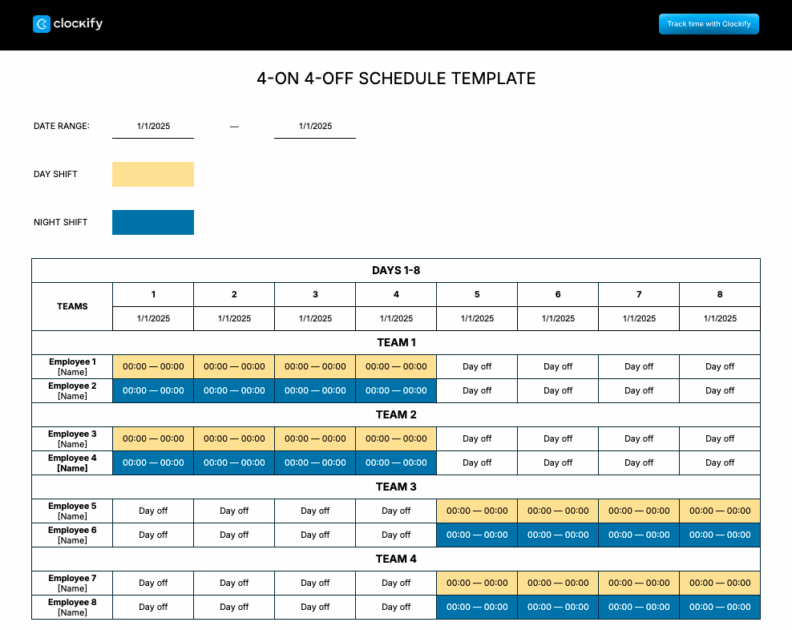
⬇️ Download 4-on 4-off shift pattern template (Google Sheets)
Pros of a 4-on 4-off schedule
Let’s weigh the ups and downs of adopting this work model — starting with the pros.
Pro #1: The 4-on 4-off schedule enhances employee well-being
The latest worldwide study on 4-day workweeks found that reduced hours are consistent with:
- Increased job satisfaction,
- Reduced burnout, and
- Better mental health in employees.
Pro #2: The 4-on 4-off schedule builds work-life balance
A stable, compressed schedule gives your staff ample time to:
- Run personal errands,
- Spend time with family, and
- Recuperate.
💡 CLOCKIFY PRO TIP
In 2025, a staggering 83% of employees worldwide prioritized work-life balance when job hunting. For more work-life balance stats, check out our article below:
Managing director at a job search platform, Jan Hendrik von Ahlen, thinks that the 4-shift schedule encourages a healthier, more productive work style:

“This schedule can align well with natural productivity cycles. Many people find it easier to immerse themselves during their 4 working days, knowing they have a whole 4-day weekend ahead.”
Moreover, working fewer days a week decreases sick leave and workplace injuries. This helps reduce paperwork for HR managers and scheduling conflicts for team leads.
Pro #3: The 4-on 4-off schedule ensures work coverage
The rotating 4-day workweek allows operations managers to maintain and oversee uninterrupted work more easily.
Labor lawyer Ryan Eddings notes that non-stop operations promote continuity and ownership:

“Four straight 10–12-hour days create fewer handoffs and tighter accountability per shift block.”
Pro #4: The 4-on 4-off schedule helps with shift predictability
A repeating shift calendar helps you streamline payroll and dodge manual errors. Clockify automatically calculates employee hours and overtime based on their tracked time.
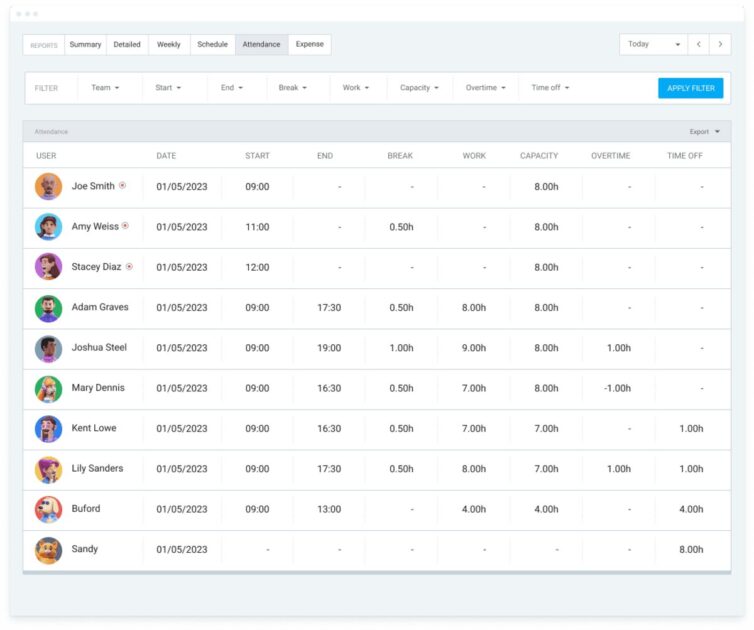
Error-proof payroll with Clockify
Cons of a 4-on 4-off schedule
Below is a shorter (yet equally important) list of downsides to the 4 days on, 4 days off schedule.
Con #1: The 4-on 4-off schedule means long shifts
Workers can get exhausted after 4 straight days of lengthy shifts — especially if they include up to 12 hours of work.
After all, employees working long hours are more likely to have:
- Mental health problems (like high stress), and
- Physical health issues (like back pain).
To stay healthy during long shifts, take a short break for every hour of work.
Con #2: The 4-on 4-off schedule contributes to irregular weekly workloads
Your staff may struggle under a schedule with a changing number of weekly workdays. In fact, Harvard’s piece on shift work downsides addresses shift work disorder — a condition that causes sleep problems in people who work:
- In the early morning,
- During the night, and
- In rotating shifts.
Poor sleep among employees usually stems from work hours that don’t align with their natural sleep cycles.
Con #3: The 4-on 4-off schedule increases work volume
Work intensity varies daily. If your employees don’t finish their tasks ahead of their rest day, they may have trouble remembering where they left off. Luckily, they can overcome time constraints using a free time management calculator.
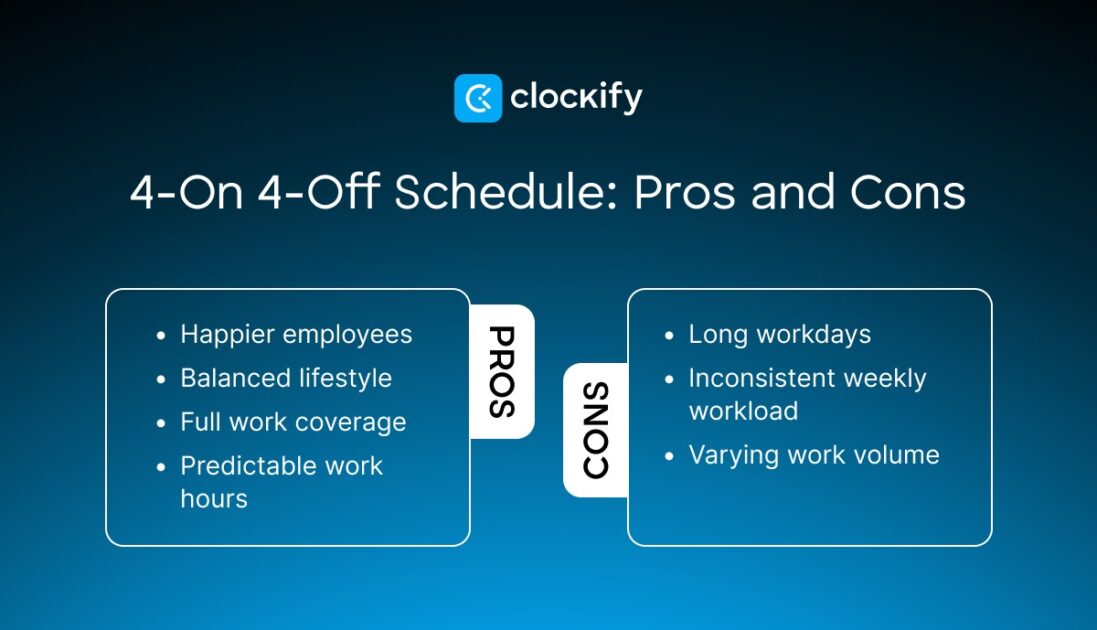
💡 CLOCKIFY PRO TIP
While you work to discourage extra hours, use our overtime calculator for easier payroll:
Top 4 alternatives for 4-on 4-off shift schedule
Companies running at all times can choose among various work schedules. But the best shift pattern will depend on your:
- Operational demands,
- Company budget, and
- Employees’ preferences.
Here are some popular substitutes for the 4-on 4-off shift pattern.
Alternative #1: Panama schedule
The Panama schedule (or 2-2-3 schedule) typically uses 4 teams, with 2 covering day shifts and 2 covering night shifts. Each team works for 2 days, takes 2 days off, and then works for 3 days.
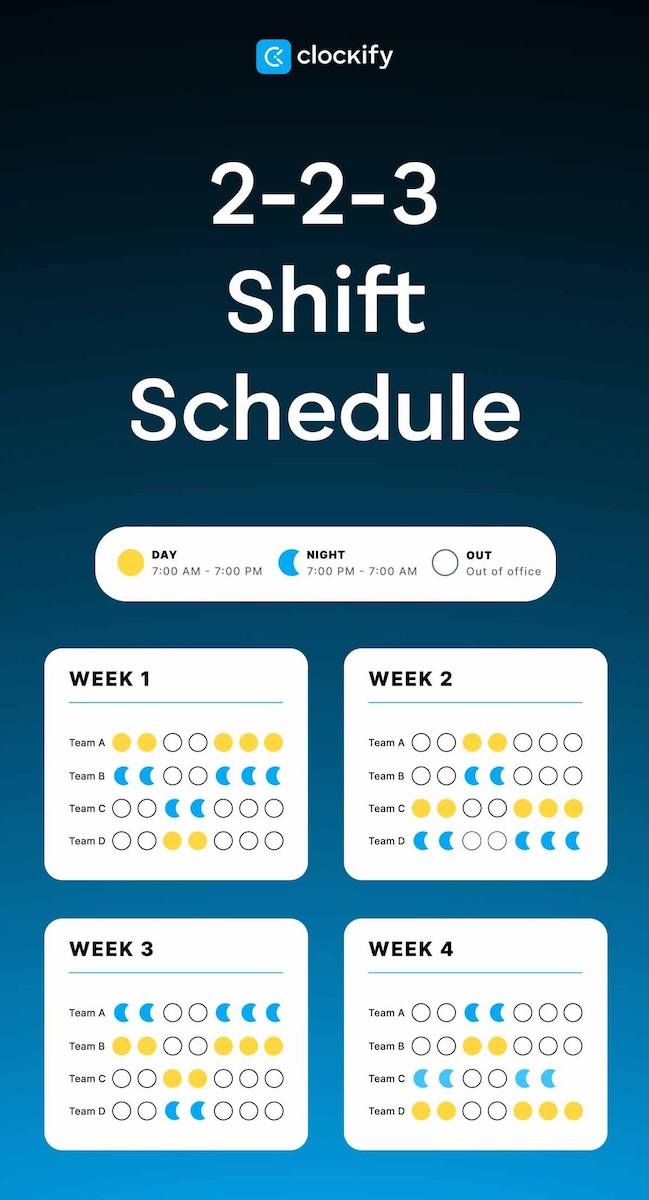
This shift pattern is a popular solution as it:
- Improves work flexibility,
- Reduces burnout, and
- Lowers absenteeism.
Alternative #2: DuPont schedule
The DuPont schedule is a rotating shift calendar where 4 teams work 12-hour shifts over a 4-week cycle:
- Week 1 — 4 night shifts and 3 days off,
- Week 2 — 3 day shifts, 1 day off, and 3 night shifts,
- Week 3 — 3 days off and 4 day shifts, and
- Week 4 — 7 consecutive days off.
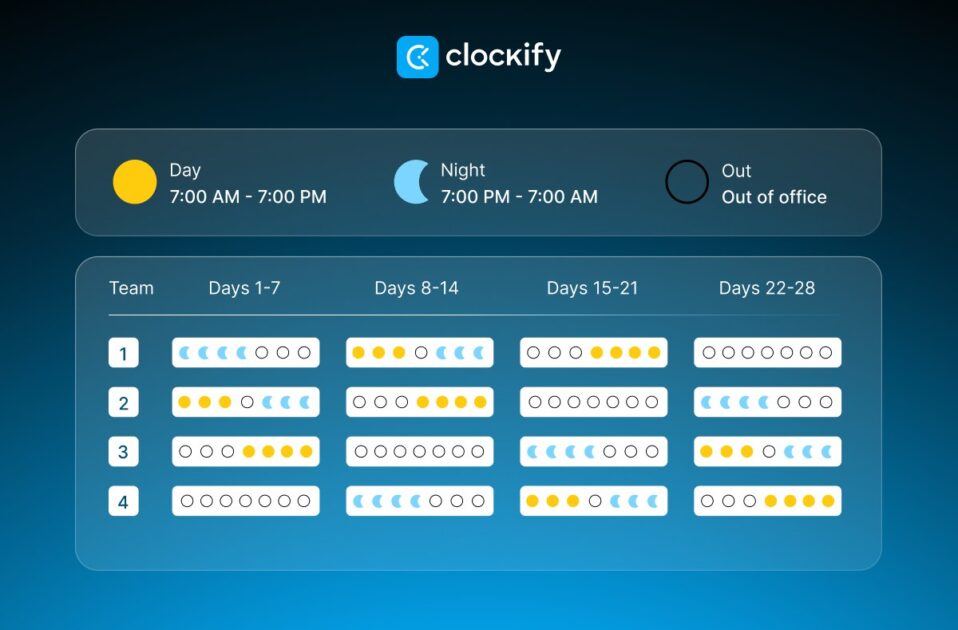
This schedule allows for even night shift distribution and a 7-day vacation every 3 weeks.
Alternative #3: 4-on 3-off schedule
Employees work for 4 straight days, followed by 3 rest days on a rotating basis. The common shift length is 10-12 hours. While enjoying multiple days off reduces the work commute, it also complicates shift planning for operations managers.
Alternative #4: Split shifts
This is a flexible work arrangement where people divide their daily work into 2 shifts. For instance, they work for several hours, take a longer break, and then return to cover the remaining work hours.
While split shifts offer more flexibility, payroll managers should also consider the labor costs. Employees are often entitled to a split shift premium, which is a higher minimum wage set by the state.
Track labor costs with Clockify
💡 CLOCKIFY PRO TIP
Set hourly rates per employee to track payroll expenses accurately:
5 steps to create a 4-on 4-off shift pattern
Now, we’ll show you how to set up a 4-day on 4-day off schedule — in just 5 steps.
Step #1: Organize your staff into teams
Each team should have enough employees with balanced workloads for full-day coverage. So, try to split your workforce into groups with:
- 8,
- 10, or
- 12-hour workdays.
While longer shifts result in fewer handovers, they can also lower employee morale. For instance, a study on 12-hour shifts and staff well-being found that people working long hours in a mental health facility may:
- Take more sick days,
- Resign from their jobs, and
- Switch to part-time or less demanding roles.
Overall, every employee should work for 4 days straight, followed by 4 days of rest, on a rotating basis.
Schedule shifts faster in Clockify
Step #2: Introduce the 4-on 4-off shift schedule
Directly communicate the new work schedule to your team members to avoid any misunderstandings.
For convenience, share all schedule updates in 1 place — like Pumble. This risk-free chat app lets you instantly:
- Create themed group chats,
- Pin messages, and
- Save posts.
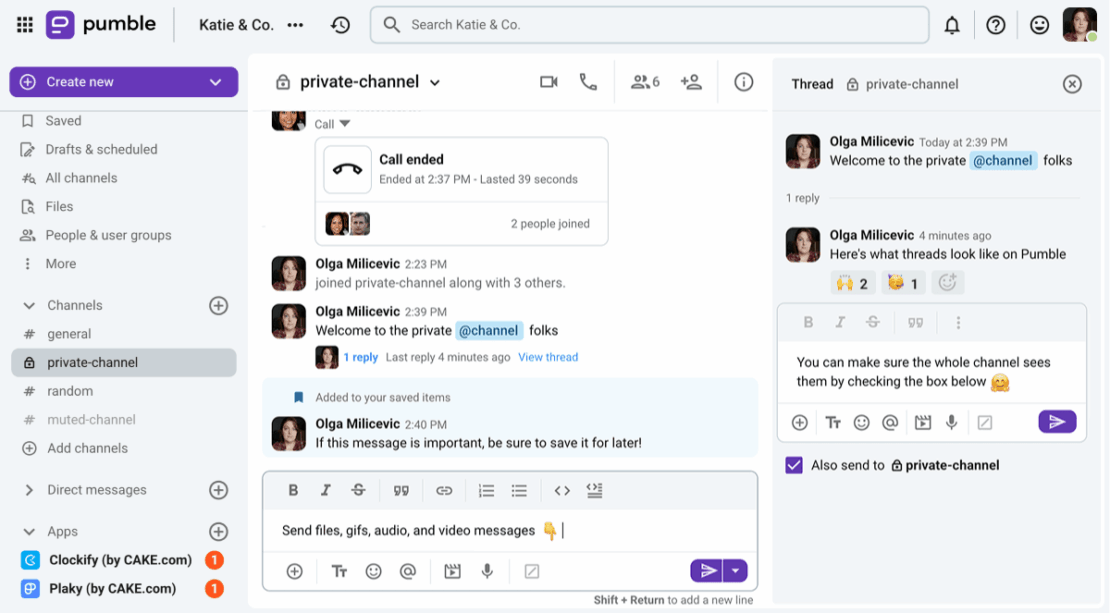
💡 CLOCKIFY PRO TIP
Virtual teams rely on digital platforms for effective collaboration. Learn how to fuel productivity among remote employees:
Step #3: Test the work schedule
Try out the 4-on 4-off shift pattern to see how effective it is for the employer and employees.
Specifically, you can set a trial period of 16 days. This timeframe allows all teams to experience both day and night shifts.
During the 16-day trial, answer employees’ questions and consider their constructive feedback on the organizational change.
Step #4: Use monitoring tools and free calculators
You’ll need a tool to track how well the 4-on 4-off schedule fits your business needs. This is where spreadsheets fall flat and time trackers like Clockify excel.
In fact, Clockify’s versatile reporting can help you gauge schedule efficiency and suitability. A simple glance at the dashboard shows you:
- Total tracked time per employee for a set time,
- Total billable hours for each project, and
- Latest team activity.
Alternatively, have your employees fill out free calculators and submit their results for easy scheduling and payroll:
- Time card calculator — enter work hours, breaks, and overtime for the whole week.
- Work time calculator — calculate daily start and end times, including breaks.
- 8-hour workday calculator — enter your start time to figure out the ideal end time based on an 8-hour workday.
This way, you’ll ditch gruelling spreadsheet formulas for reliable, auto-generated results. From there, you can decide on shift adjustments.
Use Clockify for better insights
Step #5: Create rules for legal compliance
Define or reevaluate work schedule rules in the company policy. They should cover important information and instructions, like:
- Shift types,
- Breaks and overtime,
- Changing shifts,
- Handling unplanned absences,
- Requesting time off, and more.
Fun fact: The Fair Labor Standards Act (FLSA) doesn’t mandate extra pay for night shifts. Instead, it depends on the agreement between the employer and employee.
💡 CLOCKIFY PRO TIP
Manage time off easily with a well-defined PTO policy and automated time off tracking. Here’s how to make it happen:
Run the 4-on 4-off schedule efficiently with Clockify
While accidents happen, businesses can’t afford slip-ups like payroll errors. So, minimize manual labor with Clockify — a simple yet powerful time tracker — to successfully manage the 4-on 4-off shift pattern.
Our user-friendly app makes monitoring shifts easy for any business. In fact, it only takes 4 steps to start tracking this shift schedule.
Step #1: Define the standard daily capacity for your employees (e.g., 12 hours) in Clockify’s workspace.
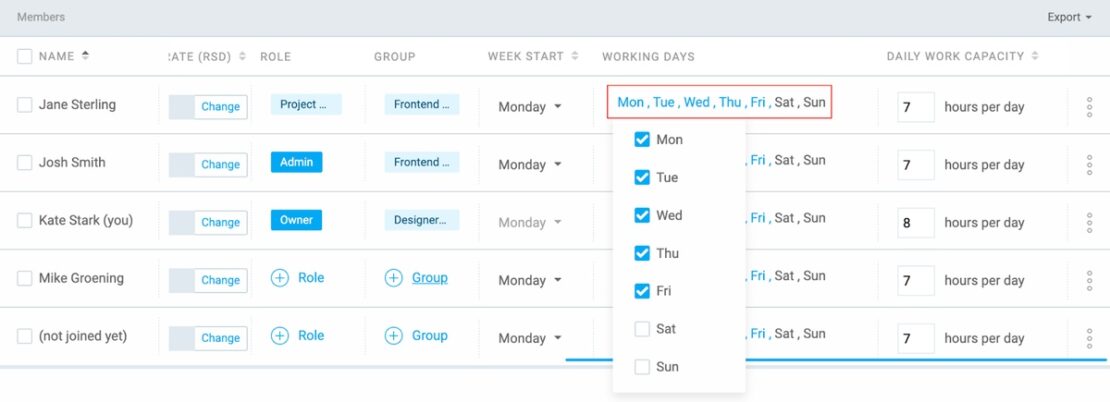
Step #2: Create projects for your teams — like “Database Administration” for IT workers or “Patient Care” for healthcare staff. This lets employees link the right projects to their time entries. You can also add tags like “day shift” and “night shift” and instruct teams to use them while tracking time.

Step #3: Use Clockify’s time-off feature to approve or reject time-off requests. First, create custom policies by defining:
- Leave type,
- Who it applies to, and
- Amount of time off available in days or hours.
As requests accumulate, filter them by date range and employee for easy access.
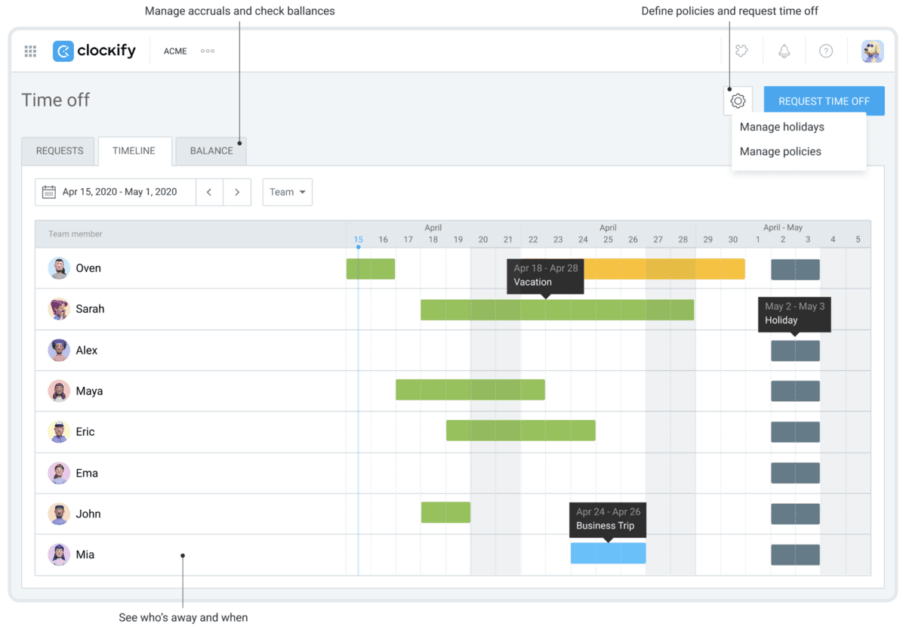
Step #4: Check in-depth reports to see how well teams follow the 4-on 4-off schedule and prevent overwork. For faster monitoring, filter reports by:
- Project — to observe specific teams, or
- Tag — to view teams by shift type.
As an operations manager, you can browse and save reports with attendance and activity data, including:
- Dates,
- Start and end times,
- Break lengths,
- Total tracked time,
- Capacity,
- Overtime, and
- Time off.
Bonus tip: Explore the CAKE.com Marketplace to stay ahead of everyone’s schedules — with free add-ons for:
- Communication,
- Analytics, and
- Productivity.
To learn more about using our affordable app for shift control, contact our full human support team.
Manage shifts and payroll stress-free — with Clockify.
REFERENCES
License for research — The impact of moving to a 12h shift pattern on employee wellbeing: A qualitative study in an acute mental health setting:



